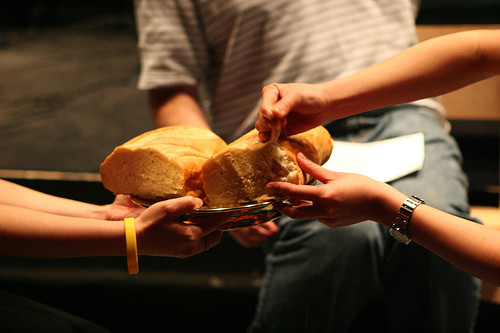“Therefore, whoever eats the bread or drinks the cup of the Lord in an unworthy manner will be guilty of sinning against the body and blood of the Lord. A man ought to examine himself before he eats of the bread and drinks of the cup. For anyone who eats and drinks without recognizing the body eats and drinks judgment on himself.” ~1 Corinthians 11:27-29
Boy, we have latched onto these three verses, haven’t we?! Our distortion of these three verses, maybe more than any other passage in the Bible, has irreversibly changed the dynamic of the Lord’s Supper from one of joyful and communal participation in salvation and life to one of somber and individual reflection on sin and death. And the key phrase in these key verses is “unworthy manner.”
The Greek word in the original text we translate “unworthy manner” is “anaxios,” and it’s an adverb, not an adjective. In this context, “unworthy” doesn’t describe you. This is not about the state of your soul or the status of your salvation or what you’re thinking about during the meal. “Unworthy” describes the way you eat and drink, the “manner” of your eating and drinking. “Unworthy” is describing the verbs, not the nouns.
Whether or not you are unworthy to eat and drink with the risen Christ and his holy people isn’t the concern. That question has already been answered: No, you are not worthy! None of us is worthy! We are unholy sinners who have no right to be in God’s presence, eating with him at his feast.
Or…
We are all worthy! By the death and resurrection of Jesus you and I are worthy! We’ve been made worthy by grace through faith in Christ. You see what we’re saying? The question of our worthiness is not the issue at stake in this passage.
The concern is, now that you’re at the Supper, how are you eating and drinking? Are you only concerned about yourself? Are you isolating yourself and others at the table? Are you paying attention to the people around you? As you eat and drink, are you recognizing the body?
The main point of the Lord’s Supper is to share it with one another, not satisfy your own needs. That’s the core of Paul’s instructions in this section of his letter to the Christians in Corinth:
“So then, my brothers and sisters, when you come together to eat, wait for each other.” ~1 Corinthians 11:33
Some translations say “welcome each other.” The point is that we eat together.
The joyful communal meal of the early Church has become a crumb of cracker and a sip of juice in quiet, somber, reflective, individual bubbles: “Don’t distract me!” Scripture says the focus during the meal, of our bodies and our brains, should be on one another.
Peace,
Allan

Leave a Reply